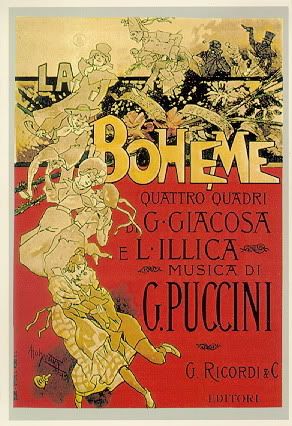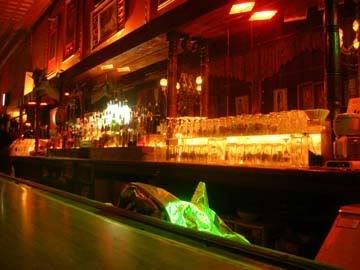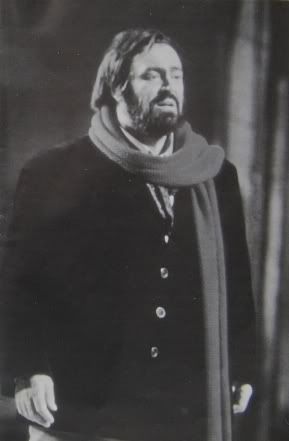
Giacomo Antonio Domenico Michele Secondo Maria Puccini was born December 22, 1858 in Lucca in Tuscany, Italy into a family with five generations of musical history behind them. Puccini decided to take an interest in opera after he and a friend walked 18 and a half miles to see a production of Aida in Pisa. In 1880, with the help of a relative and a grant, Puccini enrolled in the Milan Conservatory to study composition. While studying at the Conservatory, Puccini obtained a libretto from Ferdinando Fontano and entered a competition for a one-act opera in 1882. Although he did not win, Le Villi was later staged in 1884 at the Teatro dal Verme and it caught the attention of Giulio Ricordi, head of G. Ricordi & Co. music publishers, who commissioned a second opera, Edgar, in 1889.

La boheme, considered to be Puccini's first great masterpiece, was first preformed in 1896 in Turin. The opera would go on to become the inspiration for Rent, the most popular rock opera to date, as well as the second most popular opera in the Western hemisphere. Madama Butterfly, also written by Puccini, comes in first.
La fanciulla del West, also known as The Girl of the Golden West made its American debut at the New York Metropolitan Opera on December 10, 1910. In 1913, it was rumored that Puccini was finally on a train, travelling to the living landscape of which he had composed his opera. Iole Bachechi, a young Italian girl from Albuquerque, was thrilled to learn that she could see this famous celebrity from Lucca, Italy, the Tuscan hometown of her mother Maria Bachechi. There was definitely a Puccini on that train that stopped in Albuquerque, but it wasn't Giacomo - it was his cousin, Luigi. Luigi, a young journalist living in New York (and also from Lucca) was passing through Albuquerque, saw Iole, and fell in love. They were married in 1914.
Luigi Puccini spent the royalties from the operas written by his famous cousin buying and building theaters in the southwest. In 1929, shortly after his in-laws, Oreste and Maria Bachechi built the Kimo Theater, Luigi built the original Puccini Building, which is now known as Puccini's Golden West Saloon. Constructed by Lembke Construction, the building was originally a grocery store, and later became a paint store, a lamp store, and ultimately...

A saloon. That I work at.
The Puccini building, as well as the El Rey Theater, an addition built in 1941, still remain in the Puccini family, owned by his daughters, Adelina and Virginia, and managed by his granddaughter, Kathy Zimmer.

Luciano Pavarotti made his opera début in the role of Rodolfo, which would, debatedly, become his signature role, in La bohème on April 29, 1961 in the town of Reggio Emilia. 1963 saw the debut of the famous Franco Zeffirelli production, conducted by Herbert Von Karajan with Mirella Freni singing Mimi and Pavarotti in the role of Rodolfo. This production played in Milan, Vienna, Salzburg and Moscow and dominated the repertoire for decades. Pavarotti would go on to play the role of Rodolfo in New York, Paris, Chicago, La Scala (debatedly the most famous opera house in the world, located in Milan), Australia, Philadelphia, and in Beijing, where performed in front of 10,000 people, at the very first concert at The Great Hall of People, on the western edge of Tiananmen Square.
Pavarotti's pivotal step in becoming an internationally known celebrity occurred in 1990 when his rendition of Giacomo Puccini's aria, "Nessun Dorma" from Turandot, became the theme song of the BBC TV coverage of the 1990 FIFA World Cup in Italy. The aria achieved pop status and remained his trademark song. Turandot was Puccini's last opera, in fact it remained unfinished at the time of his death in 1924. News of Puccini's death reached Rome during a performance of La bohème. The opera was immediately stopped, and the orchestra played Chopin's "Funeral March" for the stunned audience. Pavarotti sang "Nessun Dorma" during his last major performance, at the opening of the Winter Olympics in Turin in February 2006.
The moral of the story is that it's great day to listen to some opera.


No comments:
Post a Comment